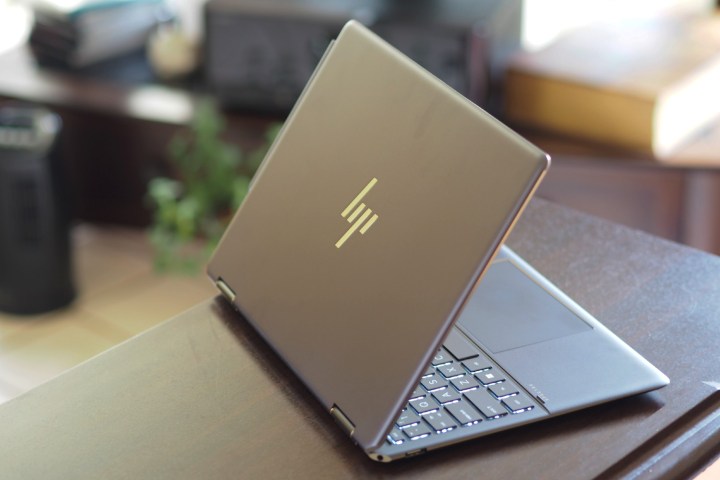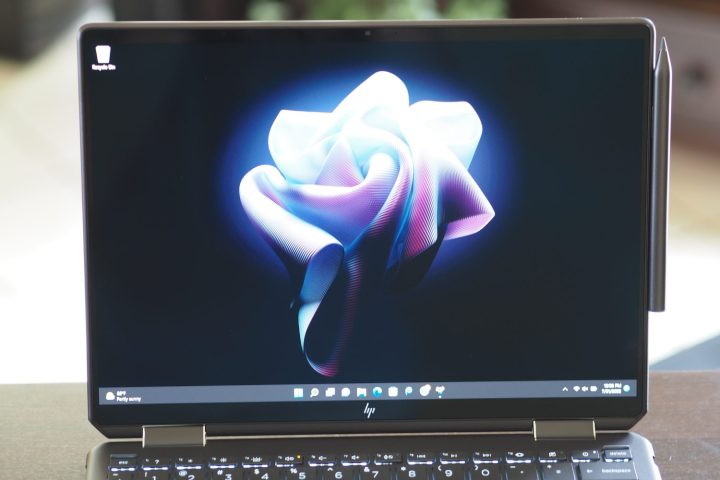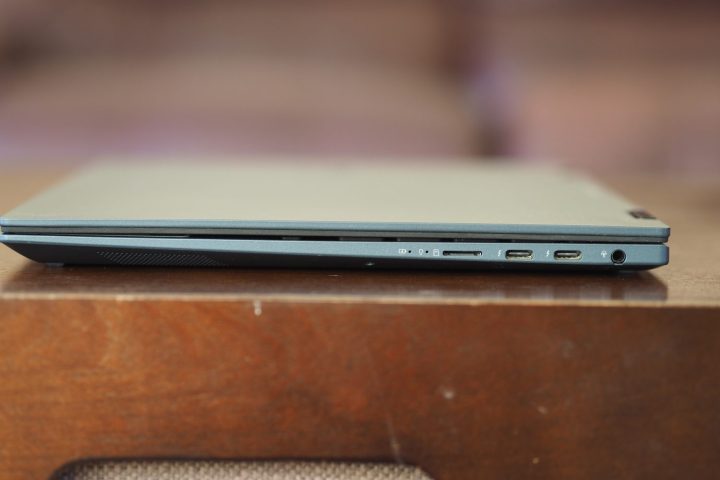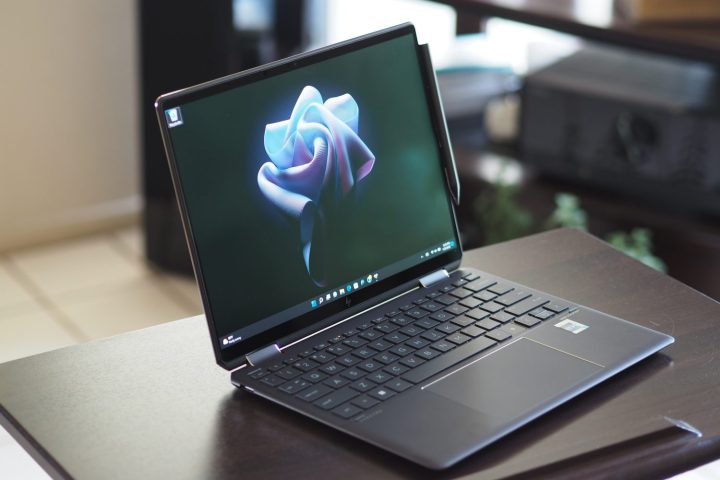Asus ZenBook S 13 Flip vs. HP Spectre x360 13.5: you can’t go wrong
The HP Spectre x360 13.5 and Asus ZenBook S 13 Flip are evenly matched in performance, longevity, and display quality. But the ZenBook is lighter and thinner.

When it comes to 360-degree convertible 2-in-1s, you have a lot of options. Some of them are among the best laptops you can buy. HP’s Spectre x360 13.5 is a prime example, making our lists of both the best 2-in-1s and best laptops and for quite some time representing the best that the class has to offer.
But Asus has been a serious player in this form factor as well, putting out several machines that have been close to making both lists. Its latest ZenBook S 13 Flip is a prime example, and it has an ace up its sleeve: it’s a very light laptop that makes it easier to use as a tablet. Does that give it enough to dethrone the Spectre x360 13.5?
Specs and configurations
| HP Spectre x360 13.5 | Asus ZenBook S 13 Flip | |
| Dimensions | 11.73 inches by 8.68 inches by 0.67 inches | 11.67 inches x 8.26 inches x 0.59 inches |
| Weight | 3.01 pounds | 2.43 pounds |
| Processor | Intel Core i5-1235U Intel Core i7-1255U |
Intel Core i7-1240P Intel Core i7-1260P |
| Graphics | Intel Iris Xe | Intel Iris Xe |
| RAM | 8GB LPDDR4 16GB LPDDR4 32GB LPDDR4 |
8GB LPDDR5 16GB LPDDR5 32GB LPDDR5 |
| Display | 13.5-inch 3:2 WXUGA+ (1920 x 1280) IPS touch 13.5-inch 3:2 WXUGA+ (1920 x 1280) IPS touch privacy screen 13.5-inch 3:2 3K2K (3000 x 2000) OLED touch |
13.3-inch 16:10 2.8K (2880 x 1800) OLED |
| Storage | 512GB PCIe 4.0 solid-state drive (SSD) 1TB PCIe 4.0 SSD 2TB PCIe 4.0 SSD |
512GB PICe 4.0 SSD 1TB PCIe 4.0 SSD |
| Touch | Yes | Yes |
| Ports | 2 x USB-C 4.0 with Thunderbolt 4 1 x USB-A 3.2 Gen 2 1 x 3.5mm audio jack 1 x microSD card reader |
2 x USB-C with Thunderbolt 4 1 x USB-A 3.2 Gen 2 1 x 3.5mm audio jack 1 x microSD card reader |
| Wireless | Wi-Fi 6E and Bluetooth 5.2 | Wi-Fi 6E and Bluetooth 5.2 |
| Webcam | 5MP with infrared camera for Windows 11 Hello | 1080p with infrared camera for Windows 11 Hello |
| Operating system | Windows 11 | Windows 11 |
| Battery | 66 watt-hour | 67 watt-hour |
| Price | $1,250+ | $1,500 |
| Rating | 4.5 out of 5 stars | 4 out of 5 stars |
The ZenBook S 13 Flip UP5302 still isn’t available for sale, but when it is, there will be just one configuration in the US. For $1,500, you’ll get a Core i7-1260P, 16GB of RAM, a 1TB SSD, and a 2.8K OLED display.
The Spectre x360 13.5 has a range of options, on the other hand, starting at $1,250 for a Core i5-1535U, 8GB of RAM, a 512GB SSD, and a 13.5-inch WUXGA+ display. You can fork out up to $1,825 for a Core i7-1255U, 16GB of RAM, a 2TB SSD, and a 3K2K OLED display. If you opt for an IPS panel, you can also configure 32GB of RAM.
Design
1. HP Spectre x360 13.5 2. Asus ZenBook S 13 FlipThe Spectre x360 13.5 has perhaps the most refined aesthetic among all 2-in-1s, with a subdued gem-cut design that’s rounded in all the right places and comfortable to hold. It has colored accents that add some panache without going overboard and offers three color schemes in Natural Silver, Nightfall Black, and Nocturne Blue. The ZenBook S 13 Flip, on the other hand, is quite minimalist, with Ponder Blue (the only color in the US) or Refined White colors and simpler lines. Both are attractive laptops, but the HP sticks out.
In terms of their construction, the Spectre x360 13.5 is all-aluminum and enjoys a rigid design with no bending, flexing, or twisting. The ZenBook S 13 Flip is also quite solid, even though it uses magnesium which tends to result in some bending and flexing in other machines. Where the ZenBook is most impressive is its weight, coming in at just 2.43 pounds compared to the Spectre’s 3.01 pounds, and it’s also considerably thinner at 0.59 inches versus 0.67 inches. They’re close to the same width and depth, although the HP is slightly deeper thanks to its taller 3:2 display versus the ZenBook’s 16:10.
The Spectre x360 13.5’s keyboard is snappier and more precise than the ZenBook S 13 Flip’s, but both are great for long typing sessions. They both have large touchpads that are responsive with quiet button clicks, but Asus adds its NumberPad 2.0 LED numeric keypad for anyone who enters a lot of numbers.
Connectivity is identical, with both offering Thunderbolt 4 ports for contemporary device support and a legacy USB-A port. Wireless connectivity is up-to-date on both as well.
The HP does have a 5MP webcam that’s theoretically higher resolution than the Asus’s 1080p version, but both provide excellent video quality. HP builds in a few more tools to optimize video, but there’s no huge advantage here. Both use infrared cameras to support Windows 11 Hello passwordless login via facial recognition, and the Spectre also features a fingerprint reader if you prefer that login method.
Performance

The Spectre x360 13.5 uses Intel 12th-gen U-series CPUs, which are 15-watt chips with 10 cores (two Performance and eight Efficient) and 12 threads. The ZenBook S 13 Flip uses P-series processors, with the same core and thread counts but runs at 28 watts. In our benchmarks, both laptops provided excellent productivity performance, and the Asus was just slightly ahead on a couple of our benchmarks. You won’t want to choose between these laptops based on performance alone.
| HP Spectre x360 13.5 (Core i7-1255U) |
Asus ZenBook S 13 Flip (Core i7-1260P) |
|
| Geekbench 5 (single / multi) |
Bal: 1,566 / 7,314 Perf: 1,593 / 7,921 |
Bal: 1,602 / 8,559 Perf: 1,639 / 8,923 |
| Handbrake (seconds) |
Bal: 169 Perf: 120 |
Bal: 132 Perf: 117 |
| Cinebench R23 (single / multi) |
Bal: 1,623 / 5,823 Perf: 1,691 / 7,832 |
Bal: 1,583 / 7,595 Perf: 1,614 / 9,220 |
Display
 Mark Coppock/Digital Trends
Mark Coppock/Digital TrendsThe Spectre x360 13.5 has a few 13.5-inch 3:2 display options, including WXUGA+ (1920 x 1280) IPS panels with and without privacy screens and a 3K2K (3,000 x 2,000) OLED panel that we reviewed. The ZenBook S 13 Flip comes with just a 13.3-inch 16:10 2.8K (2880 x 1800) OLED display. Both are excellent, with the HP being a bit brighter, having slightly deeper contrast, and better color accuracy. But again, you won’t want to choose either laptop based on its display.
| HP Spectre x360 13.5 (OLED) |
Asus ZenBook S 13 Flip (OLED) |
|
| Brightness (nits) |
380 | 337 |
| AdobeRGB gamut | 97% | 97% |
| sRGB gamut | 100% | 100% |
| Accuracy (DeltaE, lower is better) |
0.61 | 1.02 |
| Contrast ratio | 28,230:1 | 23,590:1 |
Portability
 Mark Coppock/Digital Trends
Mark Coppock/Digital TrendsWe’ve already reported that the Zenbook S 13 Flip is lighter and thinner than the Spectre x360 13.5, and it’s enough to make a difference, particularly in tablet mode. You’ll find both laptops easy to carry around, but if you want to hold the tablet for inking, the ZenBook will be more comfortable.
Thanks to its lower-wattage CPU, the Spectre x360 13.5 got better battery life on all but the PCMark 10 Applications test, where the results were close enough to even. You can likely expect about an hour more longevity from the HP in most usage conditions, and that, too, isn’t enough to differentiate these laptops.
| HP Spectre x360 13.5 (Core i7-1255U) |
Asus ZenBook S 13 Flip (Core i7-1260P) |
|
| Web browsing | 9 hours, 58 minutes | 8 hours, 38 minutes |
| Video | 13 hours, 59 minutes | 13 hours, 16 minutes |
| PCMark 10 Applications | 10 hours, 52 minutes | 11 hours, 18 minutes |
The Spectre is more refined, but the ZenBook wins on size
You’ll spend about the same amount for similarly configured machines, so set the price aside. You’ll get similar performance, battery life, and display quality, so those aren’t significant differentiators either.
Where the ZenBook S 13 Flip wins out is in its lightness and its thinness. If you want a laptop that looks great and stands out, then the Spectre is for you. But for the typical person, the ZenBook S 13 Flip ends up being the winner.

 ShanonG
ShanonG 
































/Transportation/Air/Aileen_Furlong.jpg?n=4935&tr=w-1200%2Cfo-auto)

